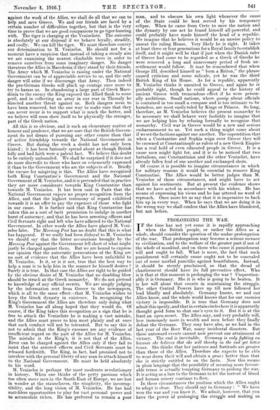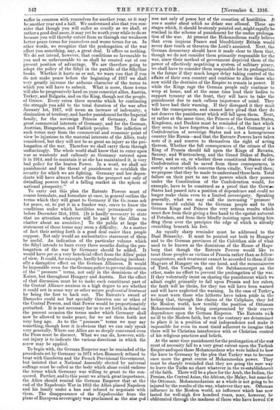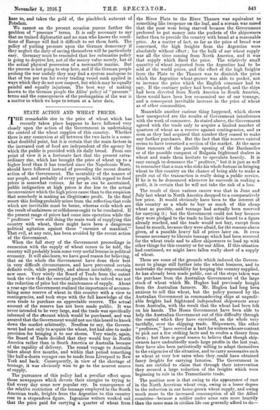PROLONGING THE WAR.
IF the time has not yet come it is rapidly approaching when the British people, or rather the Allies as a whole, should consider the question of the undue prolongation of the war. That prolongation may become a serious menace to civilization, and to the welfare of the greater part if not of the whole of mankind, and on those who cause it punishment will and ought to fall. What is more, the fact that such punishment will certainly ensue ought not to be concealed out of some morbid punctilio against boastfulness. Instead, it should be sternly proclaimed, so that the dread of chastisement should have its full preventive effect. Who is it that at this moment is prolonging the war ? Unquestion- ably it is Germany. She it is who is going to be beaten. It is her will alone that counts in maintaining the struggle. The other Central Powers have up till now followed her lead blindly and absolutely. Germany knows, we and our Allies know, and the whole world knows that for our enemies victory is impossible. It is true that Germany does not admit this openly, and that in certain circles here it is apparently thought good form to shut one's eyes to it. But it is at the least an open secret. The Allies may, and very probably will, lo3e immensely more in wealth and men before they finally defeat the Germans. They may have also, as we had in the last year of the Boer War, many incidental disasters. But these untoward events cannot now prevent our attainment of victory. The end is inevitable. Germany is only fighting on because she believes that she will thereby in the end get better terms. She thinks that her patience and fortitude are greater than those of the Allies. Therefore she expects to be able to wear down their will and obtain a peac3 better than that she is strictly entitled to on the facts. Now this means in plain language that the possibility of securing more favour- able terms is actually tempting Germany to prolong the war. It is acting as a lure to the Germans to let the torrent of blood and human misery continue to flow. In these circumstances the position which the Allies ought to adopt is clear. They should say to Germany : " We have won the war and you know it. We admit, however, that you have the power of prolonging the struggle and making us suffer in common with yourselves for another year, or it may be another year and a half. We understand also that you con- sider that though you will suffer as cruelly as we shall, or rather a good deal more, it may yet be worth your while to do so because you will thereby extort from us through our weakness better peace terms for yourselves and worse terms for us. In other words, we recognize that the prolongation of the war offers you something, nay, a great deal. It offers us nothing. We do not intend, however, that conditions so favourable to you and so unfavourable to us shall be created out of our present position of advantage. We are therefore going to adopt the policy of the Sibyl in the parable of the Sibylline books. Whether it hurts us or not, we warn you that if you do not make peace before the beginning of 1917 we shall very greatly increase the arduous character of the terms to which you will have to submit. What is more, those terms will also be progressively hard on your conscript allies, Austria, Turkey, and Bulgaria, and on the King, though not the people, of Greece. Every extra three months which by continuing the struggle you add to the total duration of the war after January 1st, 1917, will mean an increase of indemnity, a diminution of territory, and harder punishment for the Imperial family, for the sovereign Princes of Germany, for the great commercial interests of Germany, and for the German, Austrian, Hungarian, and Turkish peoples. The infliction of such terms may from the commercial and economic point of view be injurious to the material interests of the Allies, truly considered, but they will not be so great an injury as the pro- longation of the war. Therefore we shall carry them through unflinchingly. The whole world shall know that to enter upon war as wantonly and callously as Germany entered upon it in 1914, and to maintain it as she has maintained it, is very bad policy for the beaten Power. In a word, we shall use punishment and the threat of punishment to establish the security for which we are fighting. Germany and her depen- dants will have always before them the prospect not only of dwindling powers but of a falling market in the sphere of national prosperity."
To carry out this plan the Entente Powers must of course formulate, and formulate at once, in general outline the terms which they will grant to Germany if the Germans ask for peace, or, to put it in a franker way, crave to know the conditions under which hostilities may permanently cease before December 31st, 1916. [It is hardly necessary to state that no attention whatever will be paid by the Allies to chatter about an armistice.] To the public at large the Statement of those terms may seem a difficulty. As a matter of fact their setting forth is a good deal easier than people suppose. Not only would an authoritative statement of them be useful. An indication of the particular volume which the Sibyl intends to burn every three months during the pro- longation of the war by Germany should be added. It would have per se a very beneficial effect from the Allies' point of view. It could, for example, hardly help producing incident- ally, a disruptive effect on the German Alliances. It would be impossible even for the German police to prevent discussion of the " pressure " terms, not only in the dominions of the Kaiser, but throughout Hungary and Austria. But the effect of that discussion must be to make each constituent part of the Central Alliance anxious in a high degree to see whether it could not in some way or other secure preferential treatment by being the first to back out. The Entente's sword of Damocles could not but specially threaten one or other of the Central Powers, and that Power would be proportionately perturbed. It is not necessary for us to set forth in detail on the present occasion the terms under which Germany shall now be allowed to make peace, for we set them forth not very long ago. As to the " pressure " terms we may say something, though here it is obvious that we can only speak very generally. Where our Allies are so deeply concerned even the Press must be discreet. What we can do, however, with- out injury is to indicate the various directions in which the screw may be applied.
To begin with, the German Emperor may be reminded of the precedents set by Germany in 1871 when Bismarck refused to treat with Gambetta and the French Provisional Government, but insisted that a National Assembly elected by universal suffrage must be called as the body which alone could endorse the terms which Germany was willing to grant to the con- quered. Further, and to this point we attach great importance, the Allies should remind the German Emperor that- at the end of the Napoleonic War in 1815 the Allies placed Napoleon and his family under a ban and refused to negotiate with them. The disappearance of the Napoleonidae from the plane of European sovereignty was proclaimed as the sine qud non not only of peace but of the cessation of hostilities. It was a matter about which no debate was allowed. These are stages which, it should be sternly pointed out, might rapidly be reached in the scheme of punishment for the undue prolonga- tion of the war. At present the Hohenzollern really believe that even impious France and bloodthirsty Britain would never dare touch or threaten the Lord's anointed. Next, the German democracy should have it made clear to them that, though we do not consider them primarily responsible for the war, since their method of government deprived them of the power of effectively negativing a system of military piracy, we shall have to consider them responsible for its prolongation in the future if they much longer delay taking control of the affairs of their own country and continue to allow those who now wield the destinies of the Empire to remain in power. If while the Kings rage the German people only continue to weep at home, and at the same time lend their bodies to support tyranny at the front, they will have to take the punishment due to such callous impotence of mind. They will have had their warning. If they disregard it they must take the consequences, and cannot later plead that they do not deserve the punishment which will fall upon them. Next, or rather at the same time, the Princes of the German States, Kingdoms, and Duchies must be reminded of the fact which they seem to have forgotten of late—i.e., that Germany is a Confederation of sovereign States and not a homogeneous country like Russia—and that the Entente Powers have taken note of it and reserve to themselves the right of acting thereon. Whether the full consequences of the crimes of the King of Prussia should fall upon the Kings of Bavaria, Saxony, and Wurttemberg, and the Grand Dukes of Baden, Hesse, and so on, or whether these constituent States of the Confederation shall be saved from those consequences, is surely a matter which concerns them vitally. Very well then; we propose that they be made to understand these facts. Total failure on their part to use the powers which they possess under the Constitution of the Confederation would, for example, have to be construed as a proof that the Gerrroc States had passed into a position of dependence and could no longer make claim even to a limited sovereignty. Speaking generally, what we may call the increasing " pressure " terms would exhibit to the German people and to the German Kings and Princes the very serious results which must flow from their giving a free hand to the egotist autocrat of Potsdam, and from their blindly insisting upon letting him drag them over the precipice the edge of which is already crumbling beneath his feet.
An equally sharp reminder must be addressed to the Dual Monarchy. It must be pointed out both to Hungary and to the German provinces of the Cisleithan side of what used to be known as the dominions of the House of Haps- burg that though the Entente Powers would like to treat those peoples as victims of Prussia rather than as fellow- conspirators, such treatment cannot be accorded to them if the Magyars of Hungary on the one hand, and the mountaineers of Tirol, the Vorarlberg, and the Salzkammergut on the other, make no effort to prevent the prolongation of the war. If they voluntarily insist on sharing the punishment which we admit ought primarily to fall upon Prussia and her rulers, the fault will be theirs, for they too will have been warned and will have neglected the warning. In the case of Turkey, we must warn those who hitherto have taken pride in the feeling that, through the claims of the Caliphate, they led the Moslem world, how terribly the position of Ottoman Mohammedanism is being compromised by their craven dependence upon the German Emperor. The Entente wish no ill to the Moslem faith, but on the contrary are determined to place it in a position of real independence and make it impossible for even its most timid adherent to imagine that there will be Christian interference with or Christian control of his religious practices and beliefs.
At the same time punishment for the prolongation of the war must of necessity fall to a very great extent upon the Turkish Empire and upon those Mohammedans who were bribed to bow the knee to Germany by the plea that Turkey was to become once more the great centre of Mohammedan power. They must be sharply reminded that they are going the sure way to leave the Turks no share whatever in there-establishment of the faith. There will be a place for the Arab, the Indian, the Persian, the Central Asian, the African, the Malay, but none for the Ottoman. Mohammedanism as a whole is not going to be injured by the results of the war, whatever they are. Ottoman influence in the Moslem world, an influence which has now lasted for well-nigh five hundred years,, may, however, be obliterated through the madness of those who have bowed tie knee to, and taken the gold of, the pinchbeck autocrat of Potsdam.
We cannot on the present occasion pursue further the problem of " pressure ' terms. It is only necessary to say that no trained diplomatist and no man who knows the condi- tions of Europe will find it difficult to set them forth. The policy of putting pressure upon the German democracy if they neglect the duty of saving themselves will be particularly easy. Germany must be reminded that her submarine policy is going to deprive her, not of the money value merely, but of the actual physical possession of a mercantile marine. But the process is not going to stop here, and if the German people prolong the war unduly they may find a system analogous to that of ton per ton for every trading vessel sunk applied in ways which they do not now suspect, but which may be equally painful and equally injurious. The best way of making known to the German people the Allies' policy of " pressure ' terms and the consequences of the prolongation of the war is a matter to which we hope to return at a later date.
















































 Previous page
Previous page